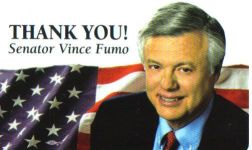Typically, prosecutors send target letters to people who are likely to be charged, as a warning and as an invitation to testify before the grand jury. It’s an offer that the targets usually refuse.
“It is the rare case, in my experience, that you can talk a prosecutor out of charges once a target letter is issued,” said Lawrence S. Lustberg, a Newark lawyer who defended one of the Commerce Bank executives convicted in the 2005 City Hall corruption trial.
However, the delivery of a target letter, part of a secret grand jury process, is no guarantee that charges will be filed.
Before prosecutors present a potential indictment in such a high-profile case, they often consult with senior Justice Department officials in Washington. Also in such cases, defense attorneys are likely to be afforded the opportunity to meet with top officials, including U.S. Attorney Patrick L. Meehan.
The Fumo investigation is focused on whether Fumo used funds from a multimillion-dollar South Philadelphia charity for personal or political benefit – and whether Fumo and staffers destroyed evidence to try to thwart the FBI.
With the grand jury’s term due to expire next month, prosecutors have subpoenaed witnesses to appear in the coming weeks, sources said.
Curated News, Culture And Commentary. Plus, the Usual Sex, Drugs and Rock n' Roll

